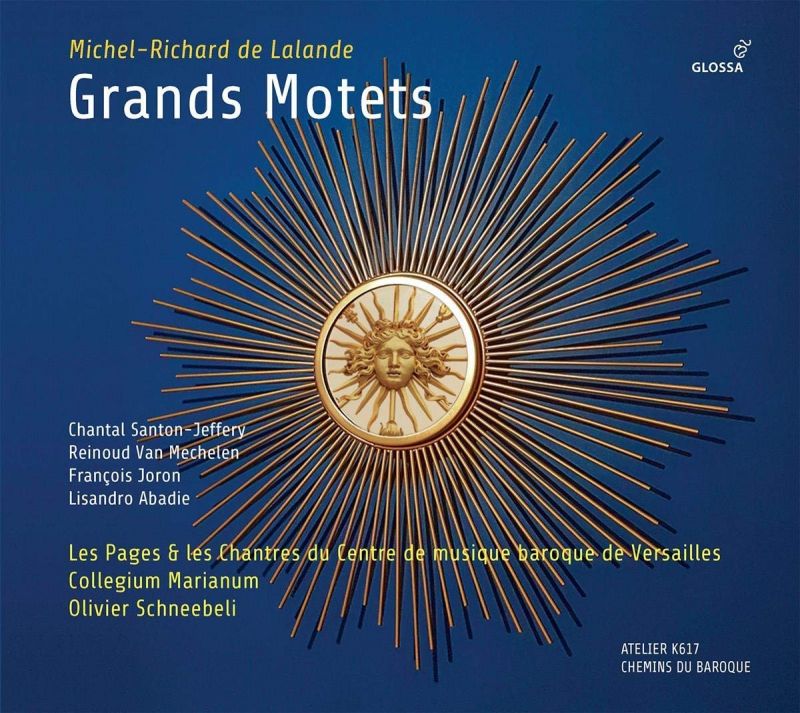LALANDE Grands Motets
View record and artist detailsRecord and Artist Details
Composer or Director: Michel-Richard de Lalande
Genre:
Vocal
Label: Glossa
Magazine Review Date: 01/2019
Media Format: CD or Download
Media Runtime: 79
Mastering:
DDD
Catalogue Number: GCD924301

Tracks:
| Composition | Artist Credit |
|---|---|
| Venite, exultemus |
Michel-Richard de Lalande, Composer
centre de musique Baroque de Versailles Chantal Santon-Jeffery, Soprano Collegium Marianum François Joron, Baritone Lisandro Abadie, Bass-baritone Michel-Richard de Lalande, Composer Olivier Schneebeli, Director Reinoud van Mechelen, Haute-Contre |
| De Profundis |
Michel-Richard de Lalande, Composer
centre de musique Baroque de Versailles Chantal Santon-Jeffery, Soprano Collegium Marianum François Joron, Baritone Lisandro Abadie, Bass-baritone Michel-Richard de Lalande, Composer Olivier Schneebeli, Director Reinoud van Mechelen, Haute-Contre |
| Dominus regnavit |
Michel-Richard de Lalande, Composer
centre de musique Baroque de Versailles Chantal Santon-Jeffery, Soprano Collegium Marianum François Joron, Baritone Lisandro Abadie, Bass-baritone Michel-Richard de Lalande, Composer Olivier Schneebeli, Director Reinoud van Mechelen, Haute-Contre |
Author: Richard Lawrence
Lalande was given to revising his grands motets after the death of Louis XIV but here we have the original versions. The earliest piece, De profundis, dates from 1689. The mood is, naturally, predominantly sombre; but there’s a charming passage in the ‘Requiem aeternam’ near the end, where a major-key, triple-time section suggests that Lalande is in no doubt that the dead will be rewarded with ‘lux perpetua’. The choir’s joyous crescendos over tied notes reinforce the point.
Whereas in De profundis verse often succeeds verse without a break, the other two motets are divided into sections. In Venite, exultemus Domino, from 1701, Lalande again confounds expectation. Amid the jubilation there’s a bass solo and chorus, ‘Venite, adoremus’, where a slow tempo and Neapolitan sixth chords convey a sense of awe. ‘Quoniam Deus’ is similarly inward-looking, before the choir breaks in with cheerful counterpoint around a cantus firmus. Another number for bass, ‘Quoniam non repellet Dominus’, is enhanced by oboe and bassoon, while two flutes introduce the weeping curiously absent from the standard English translations.
Dominus regnavit, composed in 1704, is in similar mould, with a pleasing variety of mood and texture. Perhaps Schneebelli overdoes the staccato in ‘Illuxerunt fulgura ejus’, but his French choir of children and adults can’t be faulted, and the recorded balance is excellent. The woodwind solos and the rich, Lullian string textures are beautifully handled by Collegium Marianum, an ensemble from the Czech Republic. A little more weight from Lisandro Abadie would have been welcome, but all four soloists sing with a passion by no means alien to Lalande’s operatic style. This is a most distinguished issue.
Discover the world's largest classical music catalogue with Presto Music.

Gramophone Digital Club
- Digital Edition
- Digital Archive
- Reviews Database
- Full website access
From £8.75 / month
Subscribe
Gramophone Full Club
- Print Edition
- Digital Edition
- Digital Archive
- Reviews Database
- Full website access
From £11.00 / month
Subscribe
If you are a library, university or other organisation that would be interested in an institutional subscription to Gramophone please click here for further information.




